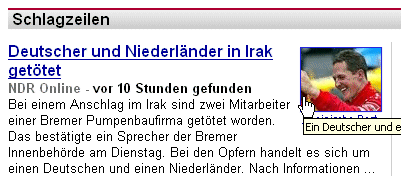Wednesday, March 17, 2004
Yahoo Video
See this video on Yahoo: Past, present and future (“Yahoo chiefs Terry Semel and Jerry Yang talk to author and columnist Kara Swisher in front of a large crowd at the Commonwealth Club in San Francisco”, March 2, 2004).
SERPs Competition Sites Have High PR
Interesting – most of the sites taking part in the SERPs competition now have PageRanks of 5 or 6.
Tool Knows Your PageRank
I wonder how they do it – this PageRank tool lets you enter a URL and tells the Google PageRank assigned to it. E.g. it worked with http://blog.outer-court.com, showing 6/10... the same value I also see using the Google toolbar.
Google News With Wrong Images
Dr. Web points to the Google News Germany headline which read “German and Dutch Killed in Iraq” while showing a photo of Formula 1 driver Michael Schumacher.

Göögle.com
The new Umlaut-and-other-special-characters-Domains are available and many are already registered. Like www.göögle.com or www.göögle.de.
Be aware that when you run Internet Explorer, by default it doesn’t understand how to handle Umlaut-Domains. However VeriSign will ask you to install a browser-extension to resolve those domains. Installing it will also give you some dubious stuff you didn’t ask for (like Outlook plug-ins, or changed address bar functionality), with no easy way to remove it afterwards.
Now what is the use of domains like “Göögle"?
-
The domain owner of "Google.com" might want to protect his own domain and now needs to register hundreds of variants (like goôgle.com, goögle.com, góogle.com and so on).
-
Someone wants to go online with a fake page either for humor purpose (microsöft.com currently reads “Bill Sux”).
-
A hacker wants to fool people (e.g. paypäl.com might ask for logins).
-
In the case of domains with words that actually do contain an Umlaut in the first place – e.g. the German word “Gemälde” (“paintings”) –, use might be legitimate (though more often than not it’s straight-forward domain-squatting).
Possible New “Google” Domains
The new characters are [ä ö ü é è á à ú ù ê â û ô ó ò í ì î] and [ß] (which will be resolved to “ss”). Here
are some possible variants of Google.com (these are not all possibilities):
www.göogle.com - www.göogle.de - www.goögle.net - www.goögle.info - www.göogle.co.uk - goögle - googlé - göoglé - goöglè - gööglê - gôôgle - göógle - gòògle - ...
The German "ß"
The German "ß" ("sharp s", as we call it) is a bit of an exception. Though entering it is supported it will
actually lead to "ss". The german "ß" character closely resembles the upper-case "B".
(This is why in German language, if you have an all-upper-case word or sentence, you replace
"ß" with "ss" as well, e.g. "Großbuchstaben” turns to “GROSSBUCHSTABEN”).
This situation again can be a hacker’s friend: manipulate users to click on “eßay.com” in an email and they will end up at “essay.com”, potentially without noticing. If “essay.com” was a hacker’s homepage, it could be styled to look like eBay and collect user passwords.
>> More posts
Advertisement
This site unofficially covers Google™ and more with some rights reserved. Join our forum!
